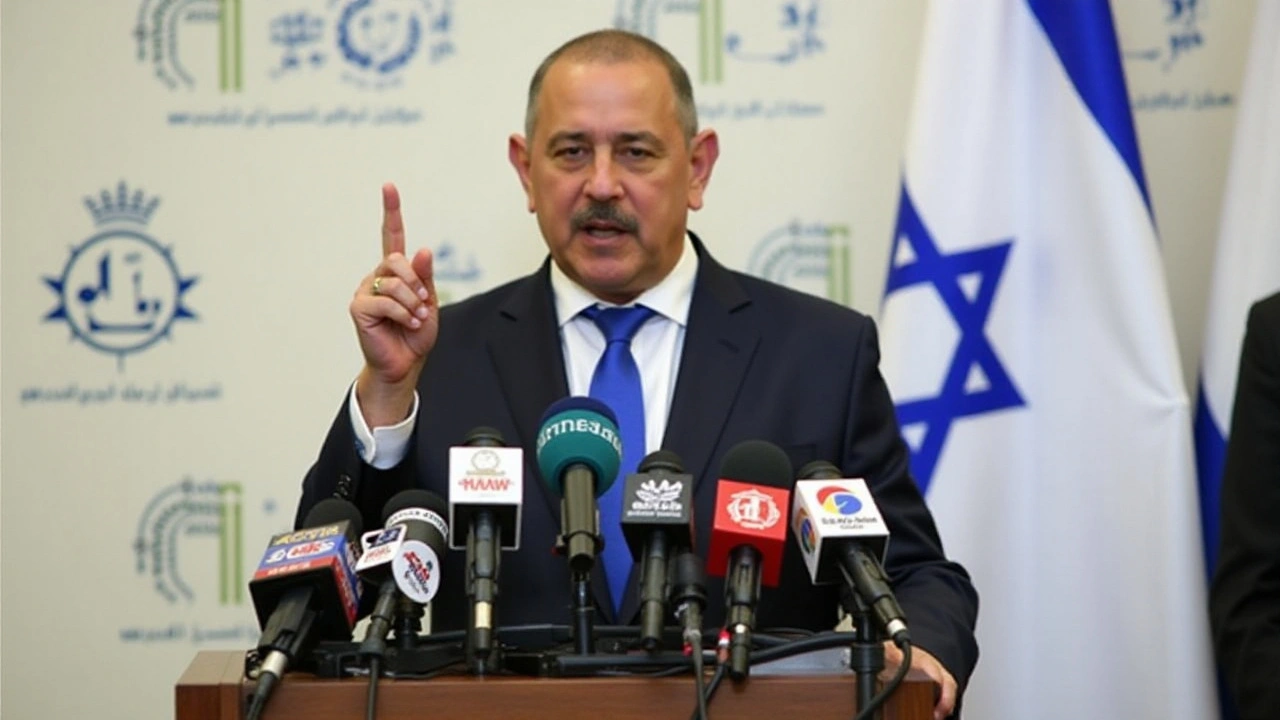Saudi-Israeli Peace Prospects: Unveiling Expert Insights and Obstacles

Saudi-Israeli Peace Prospects: Unveiling Expert Insights and Obstacles
The potential normalization of relations between Saudi Arabia and Israel, a crucial step toward peace in the Middle East, has been a topic of intense discussion. In an exclusive interview, Saudi writers and an Israeli expert shed light on the intricacies of this process, highlighting both the progress made and the challenges that lie ahead. Their insights are invaluable as they offer a comprehensive understanding of the landscape, obstacles, and what is needed to advance the peace efforts.
The Momentum from Abraham Accords
The Abraham Accords have been a significant milestone, increasing the acceptance of Israelis throughout the region. These agreements have laid a foundation upon which future interactions and peaceful relations can be built. According to the experts, everyday encounters between Saudis and Israelis have become more common, fostering an environment conducive to normalization. This growing acceptance stems largely from the perceived mutual benefits of such relations.
One critical element driving the push for normalization is Crown Prince Mohammad Bin Salman's ambitious Vision 2030. This transformative blueprint for Saudi Arabia aims to diversify the kingdom's economy and open it up to international partnerships. Peace with Israel is seen as a strategic step aligned with these objectives, promising economic and social benefits for both nations. The framework of Vision 2030 makes peace not just desirable but necessary in the context of regional development and stability.
The Role of Adversaries
Despite the progress, formidable challenges remain. Adversaries such as Iran and Hamas are actively working to disrupt the peace process. The October 7 massacre, as noted by the experts, was a calculated effort to derail normalization efforts. Iran's strategy thrives on chaos and instability, seeing the potential Saudi-Israeli alliance as a direct threat to its influence in the region. The experts stress that understanding and countering these disruptive tactics is crucial for any peace efforts to succeed.
The Crucial Role of the Palestinian Authority
A recurring theme in the discussion was the need for a more reliable and less corrupt Palestinian Authority (PA). The lack of consensus on a two-state solution continues to complicate the peace process. Alkhamis, a Saudi journalist, highlighted that Palestinians are unlikely to consent to a status quo where they remain stateless. He emphasized the importance of maintaining hope for the Palestinian people while safeguarding Israel's security. This balance, he argues, is pivotal to any lasting peace.
Alkhamis proposed that Arab-Israeli-American cooperation is vital to creating a viable Palestinian state that doesn't compromise Israel's security. This cooperation, he argues, is more efficient than relying solely on the Israel Defense Forces (IDF) for security. The proposition is that through collaboration, a framework can be established where both Palestinian aspirations and Israeli security needs are met, paving the way for a sustainable peace.
The Need for Effective Mediation
According to AlSaied, another expert, a skilled mediator is indispensable in the peace process. However, she warns that the current US administration faces perceptions of corruption, which may limit its effectiveness. AlSaied points out that political Islam and its various factions, including Iran and its militias, the Muslim Brotherhood, and Qatar, represent the main adversaries to peace. These groups have vested interests in perpetuating instability and obstructing any steps toward normalization.
AlSaied further claims that Iran's motivation for the October 7 attack stems from its dependence on regional turmoil. For peace to be achieved, Saudi Arabia has set specific conditions, including the establishment of a Palestinian state and certain concessions from the United States. These conditions, if met, could provide a framework for a stable and enduring peace in the region.
Balancing Regional Relations
The experts also acknowledge the delicate balancing act that Saudi Arabia must perform. The kingdom has to navigate its relations with various countries while addressing the Palestinian issue. This geopolitical tightrope requires careful consideration of the interests and concerns of all parties involved. The role of the United States in this equation is crucial; its involvement is necessary for building a lasting peace.
The necessity for Saudi Arabia and Israel to work together cannot be overstressed. Cooperation between these nations is seen as a cornerstone for regional stability. By combining their efforts, they can tackle common threats and foster an environment that supports economic growth and social development. Such collaboration would not only benefit both nations but also contribute to broader peace and stability in the Middle East.
Looking Ahead
The path to Saudi-Israeli normalization and peace is fraught with obstacles, but the potential rewards make it worth pursuing. The insights shared by the experts provide a roadmap for overcoming the challenges and building a future where both nations can thrive. It requires a concerted effort from all parties involved, including the United States, to create a sustainable and peaceful future for the region.
As the dialogue continues, the focus remains on finding common ground and addressing the concerns of all stakeholders. By fostering mutual understanding and cooperation, Saudi Arabia and Israel can move closer to a peaceful coexistence, setting an example for the rest of the Middle East. The journey is complex, but with dedication and strategic collaboration, peace is within reach.






Jordan Bowens
October 1, 2024 AT 21:58Just another geopolitical saga, nothing new.
Kimberly Hickam
October 8, 2024 AT 20:38The tapestry of Middle Eastern diplomacy is more tangled than a bowl of spaghetti after a midnight feast.
When we examine the Saudi‑Israeli overture, we must first acknowledge the undeniable momentum generated by the Abraham Accords.
Those accords, while not a panacea, have carved out a corridor of tolerance that was previously sealed shut by decades of suspicion.
Vision 2030, with its glittering promises of diversification, is not merely an economic playbook but a strategic manifesto that implicitly invites regional partners.
In this framework, the prospect of peace with Israel becomes a lever, not a luxury, for Saudi Arabia to project a modern, forward‑looking image.
Yet, let us not be naive; the very same corridors are haunted by specters of Iran’s Machiavellian designs, which thrive on perpetual instability.
The October 7 horror, orchestrated by actors with vested interests in chaos, was a calculated attempt to derail any semblance of normalization.
Moreover, the Palestinian Authority’s chronic corruption undermines its credibility as a negotiating partner, leaving a vacuum that external powers are eager to fill.
One could argue that the United States, despite its proclaimed impartiality, is increasingly perceived as a compromised broker, its moral high ground eroded by partisan spin.
The experts cited in the piece rightly caution that without a legitimate, less corrupt Palestinian interlocutor, any peace settlement risks being a hollow shell.
Yet, the calculus of realpolitik dictates that Saudi Arabia may prioritize economic gains over the altruistic pursuit of a two‑state solution.
This pragmatic stance, while understandable, may sow deeper resentment among the Arab populace, who view the Palestinian cause as sacrosanct.
In parallel, Israel’s security concerns cannot be dismissed; any agreement must incorporate robust mechanisms to safeguard its citizens from militant incursions.
The delicate dance between security and sovereignty thus becomes the fulcrum upon which any lasting agreement will pivot.
Ultimately, the success of this diplomatic ballet hinges on the ability of mediators to balance these competing imperatives without succumbing to the siren calls of extremist factions.
If the region can navigate this labyrinthine maze, the reward could be a transformative peace that reverberates far beyond the immediate borders.
Gift OLUWASANMI
October 15, 2024 AT 19:18Alright, let’s cut through the fluff – the Saudis are eyeing cash flow and tech transfers more than any lofty ideal of brotherhood.
They’ll tango with Israel if the market pings, but don’t expect them to ignore the street‑level backlash from hard‑liners who still clutch the old grievances.
The Iranian puppeteers love this limbo; they’ll fan the flames whenever they smell a whiff of compromise.
What’s missing is a genuine Palestinian agency that isn’t just a bargaining chip for external powers.
Until that gap narrows, any handshake feels like a staged photo op.
Keith Craft
October 22, 2024 AT 17:58Oh, the drama of nations colliding, the cries of old wounds echoing across deserts and cityscapes alike!
One cannot help but feel the weight of history pressing upon each diplomatic overture, a theatrical performance where every line is laced with centuries of unresolved pain.
Yet, amid the thunderous applause of political elites, the real people watch, their hopes flickering like candles in a storm.
The promise of peace is a siren song, intoxicating yet terrifying, for it threatens to upend entrenched narratives that have defined identities for generations.
Will the actors on this grand stage muster the courage to step beyond their scripted roles?
Kara Withers
October 29, 2024 AT 15:38It helps to remember that sustainable peace requires concrete steps, not just lofty rhetoric.
Economic incentives for both sides can be structured around joint projects in technology and renewable energy, creating interdependence.
Meanwhile, a renewed, transparent Palestinian governance framework would bolster credibility in negotiations.
These practical measures, if implemented earnestly, could lay the groundwork for lasting stability.
boy george
November 5, 2024 AT 14:18Saudi‑Israel talks are a chess move that could shift regional power balances.
Both nations stand to gain from reduced hostility and increased trade.
The real test will be managing external pressures.
Cheryl Dixon
November 12, 2024 AT 12:58While the chess analogy is neat, it overlooks the human cost of such maneuvers.
We’re not just moving pieces; we’re reshaping lives that have endured enough hardship.
Any agreement should prioritize dignity over strategic gain.
Otherwise, the board will remain forever stained.
Ramesh Modi
November 19, 2024 AT 11:38Consider, if you will, the intricate tapestry of historical grievances, the endless chorus of narratives, each demanding acknowledgment, each wielding its own brand of moral authority, and yet, amidst this cacophony, there emerges a faint but resolute whisper of compromise, a tentative step toward coexistence that, while fragile, holds the promise of a new paradigm, one where economic interdependence, cultural exchange, and shared security concerns intertwine, forging a bond that transcends the old binaries, and perhaps, just perhaps, this delicate dance, if nurtured with patience and humility, might pave the way for a future where the shadows of past animosities recede, giving rise to a horizon illuminated by mutual respect and collaborative progress.
Ghanshyam Shinde
November 26, 2024 AT 10:18Sure, talk about progress, but who’s actually paying the bill?
If it’s the average citizen, then all that talk is just smoke.
Charlotte Louise Brazier
December 3, 2024 AT 08:58Enough with the lofty jargon – real peace comes from inclusive dialogue, not elite backroom deals.
We must empower grassroots voices across the region, ensuring that any agreement respects human rights and economic justice.
Only then can we claim a genuine, lasting resolution.